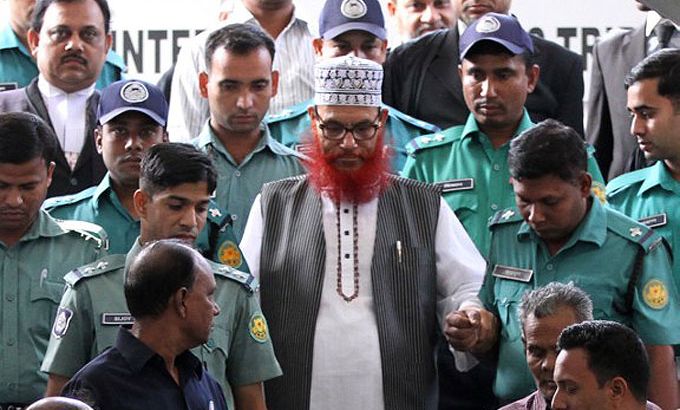Bangladesh verdict sparks deadly protests
Clashes break out after sentencing of Jamaat politician to death by court investigating 1971 liberation war atrocities.

At least 34 people are reported to have been killed and hundreds injured in protests in Bangladesh after a member of the opposition was sentenced to death for war crimes.
Delwar Hossain Sayedee, 73, is the third prominent figure from Jamaat-e-Islami party to be found guilty of mass killings by a court set up to investigate abuses during the country’s 1971 war of independence from Pakistan.
Jamaat, the country’s largest Islamist party, called for a 48-hour national strike on Sunday, amid clashes between opposition supporters and police that left nearly 200 people injured in more than a dozen districts across the country.
Dhaka, the Bangladeshi capital, was tense in the run-up to the verdict.
About 10,000 policemen were on patrol and the government also deployed border guards as reinforcement to prevent violence.
Schools and shops were shut and roads in Dhaka and inter-city motorways were empty.
Mass killing charges
Sayedee, vice-president of Jamaat, was found guilty of charges of mass killing, rape, arson, looting and religious persecution during the liberation war, lawyers and tribunal officials said on Thursday.
“The verdict has appropriately demonstrated justice. We are happy,” Haider Ali, state prosecutor, said.
Lawyers for Sayedee boycotted the tribunal during the verdict.
“I didn’t commit any crime and the judges are not giving the verdict from the core of their heart,” he told the court.
He had previously denied the allegations and said the charges were politically motivated.
Jamaat has denounced the trial.
Earlier this month, the tribunal sentenced Abdul Qader Molla, Jamaat’s assistant secretary general, to life imprisonment, leading to deadly protests that left 16 people dead.
Secular protests
Molla’s verdict enraged secular protesters, tens of thousands of whom have since poured onto Dhaka’s Shahbag Square to reject the “lighter sentence” and demand the execution of Jamaat leaders.
Another Jamaat leader, Maulana Abul Kalam Azad, was sentenced to death in absentia last month.
Seven other top leaders of Jamaat are on trial for their alleged role in the atrocities during the liberation war.
Sheikh Hasina Wajed, the Bangladesh prime minister, set up the tribunal in 2010 to investigate abuses during the independence war that, by many accounts, claimed about three million lives and during which thousands of Bengali women were raped.
The tribunal, a domestic body with no international oversight, has been criticised by the opposition as targeting its members.
But the scale of recent secular protests show a large section of Bangladeshis support moves to punish those linked to atrocities during the liberation war.